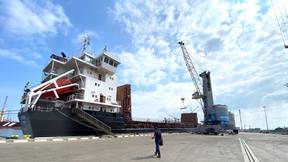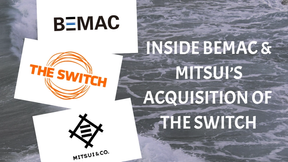U.S. Judge Annuls Gulf of Mexico Oil Auction Over Climate Impact
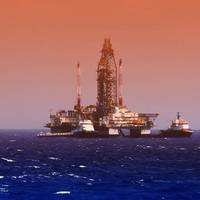
A federal judge invalidated the results of an oil and gas lease sale in the Gulf of Mexico on Thursday saying the Biden administration failed to properly account for the auction's climate change impact.The decision has cast uncertainty over the future of the U.S. federal offshore drilling program, which has been a big source of public revenue for decades but also drawn the ire of activists concerned about its impact on the environment and contribution to global warming.The Gulf of Mexico accounts for 15% of existing U.S.
Biden Announces Return to Global Climate Accord, New Curbs on US Oil Industry

U.S. President Joe Biden on Wednesday announced America's return to the international Paris Agreement to fight climate change, the centerpiece of a raft of day-one executive orders aimed at restoring U.S. leadership in combating global warming.The announcements also included a sweeping order to review all of former President Donald Trump's actions weakening climate change protections, the revocation of a vital permit for TC Energy's Keystone XL oil pipeline project from Canada…
Baltic Index [Finally] Gains on Higher Capesize Demand
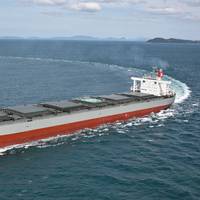
The Baltic Exchange's main sea freight index, tracking rates for ships transporting dry bulk commodities, snapped its 12-day losing streak on Thursday, powered by a rise in demand for capesize vessels.The overall index, which factors in rates for capesize, panamax and supramax shipping vessels, gained 11 points or 1.1 percent - after falling 12 sessions in a row - to 1,020 points.The capesize index marked its first gain in 12 days, rising 7.1 percent, or 67 points, to 1,007 points.
Baltic Index Marks First Gain in 13 days on Higher Capesize Demand
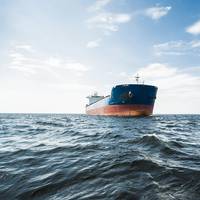
The Baltic Exchange's main sea freight index, tracking rates for ships transporting dry bulk commodities, snapped its 12-day losing streak on Thursday, powered by a rise in demand for capesize vessels.* The overall index, which factors in rates for capesize, panamax and supramax shipping vessels, gained 11 points or 1.1 percent - after falling 12 sessions in a row - to 1,020 points.* The capesize index marked its first gain in 12 days, rising 7.1 percent, or 67 points, to 1,007…
Baltic Index Weighed Down by Weaker Capesize Rates
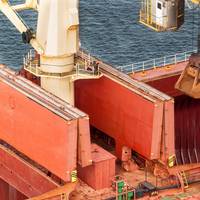
The Baltic Exchange's main sea freight index, tracking rates for ships transporting dry bulk commodities, fell on Friday, dragged down by weaker demand for capesize vessels.* The overall index, which factors in rates for capesize, panamax and supramax shipping vessels, lost 18 points, or 1.2 percent, to 1,536 points.* The capesize index dipped 67 points, or 3.1 percent, to 2,081 points.* Average daily earnings for capesizes, which typically transport 170,000-180,000 tonne cargoes such as iron ore and coal…
Oil Tanker Scrapping to Hit Multi-year High
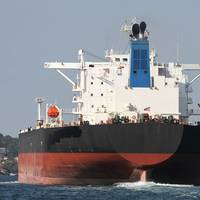
The shipping industry will this year scrap the largest number of oil tankers in over half-a-decade, driven by weak earnings, firm prices for scrap steel and the need to prepare fleets for strict new environmental regulations.The surge in scrapping underscores how the sector is grappling with one of its worst-ever crises, hit hard after rates for transporting oil plunged to multi-year lows in the wake of excess tanker supply and tepid demand as OPEC production cuts bite."The tanker markets are definitely in a trough at the moment…
Baltic Index Slumps On Weaker Vessel Rates
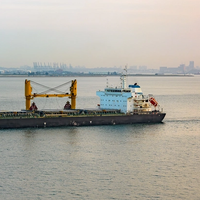
The Baltic Exchange's main sea freight index, tracking rates for ships carrying dry bulk commodities, fell on Tuesday to eight-month lows as rates dropped across vessel segments. The overall index, which factors in rates for capesize, panamax and supramax shipping vessels, was down 39 points, or 3.7 percent, at 1,016 points, its lowest since Aug. 2, 2017. "The current weakness is not particularly surprising – the real surprise is that the weakness comes this late," said Peter Sand…
Baltic Index Stretches Losing Streak
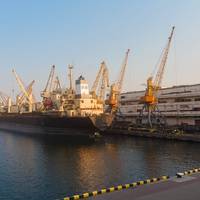
The Baltic Exchange's main sea freight index extended its slide to a fourth straight session to touch a near six-month low on Thursday, as rates fell for all vessel segments amid a seasonal slowdown in demand. The overall index, which tracks rates for ships carrying dry bulk commodities, dropped by 38 points, or 3.3 percent, to 1,114 points, the lowest since Aug. 10, 2017. The index recorded a 15.66 percent decline in January, its biggest monthly percentage fall since May 2017.
China, Australia Ports Clogged as Coal, Ore Demand Soars
Around 300 ships caught in jam that would stretch 40 miles; freight rates for biggest coal, ore carrier hit 3-yr high. More than 300 large dry cargo ships are having to wait outside Chinese and Australian ports in a maritime traffic jam that spotlights bottlenecks in China's huge and global commodity supply chain as demand peaks this winter. With some vessels waiting to load coal and iron ore outside Australian ports for over a month, key charter rates have jumped to their highest in more than three years. Placed end-to-end, the total delayed fleet would stretch more than 40 miles, enough to span the English Channel from Dover to Calais and back.
Baltic Index Hits More Than 3-year High on Strong Capesize Rates
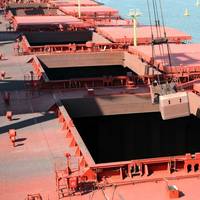
The Baltic Exchange's main sea freight index, tracking rates for ships carrying dry bulk commodities, rose to its highest in three-and-a-half years on Friday, boosted by strong capesize rates. The overall index, which factors in rates for capesize, panamax, supramax and handysize shipping vessels, rose 32 points, or 2.18 percent, to end at 1,502 points, its highest since March 2014. The capesize index was up 199 points, or 6.75 percent, at 3,147 points, its highest level since November 2014.
Baltic Index Hits near 3-year High
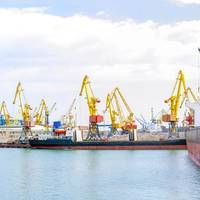
The Baltic Exchange's main sea freight index, tracking rates for ships carrying dry bulk commodities, touched a near three-year high on Monday, supported by higher rates across all vessel segments. The overall index, which factors in rates for capesize, panamax, supramax and handysize shipping vessels, gained 23 points, or 1.73 percent, at 1,355 points - the highest since Nov. 2014. "The market has been solely driven forward by the capesize shipping segment this year. Only recently have we seen panamax and handysize climb to profitable freight rates…
Asia Tankers-VLCC Rates to Hold Steady
25 MidEast cargoes still to be fixed; VLCC rates fall to 4-month low. Freight rates for very large crude carriers (VLCCs), which hit a four-month low on Thursday, are likely to hold around current levels or nudge higher as charterers fix the final charters in February's loading programme from the Middle East. Brokers however said an oversupply of tonnage from a raft of new vessel deliveries and older tonnage coming free after being used for floating storage are expected to cap any gains in rates. Around 25 VLCC cargoes from the Middle East have yet to be fixed, said Ashok Sharma, managing director of ship broker BRS Baxi in Singapore. "That will make for a busy week next week.
Asia Dry Bulk-Capesize Rates to Hold Steady
Floor may have been reached on Western Australia-China rates; dry cargo demand could fall 5.4 pct in first quarter. Freight rates for large capesize dry cargo vessels on key Asian routes are likely to hold around the current levels next week on ample tonnage supply even as chartering activity is likely to increase following the end of the Chinese New Year holidays. "Some people think rates may have hit a floor in the Pacific," a Singapore-based capesize broker said on Thursday. "At the moment there is no sign of a revival in rates. It really depends on the volume of cargo that comes out next week," the broker added. Both the Atlantic and Pacific basins are well stocked with capesize vessels waiting for employment, the broker said.
Subsidy-Reliant Offshore Wind Takes Cue from Big Oil
From a helicopter, it looks like just another North Sea oil rig, a grey cube supported by massive yellow pillars, 90 kilometres (56 miles) off western Denmark. But the DanTysk facility is the world's first accommodation platform for offshore wind, which is borrowing techniques and labour from the crisis-hit oil sector as it tries to cut costs and end an addiction to state subsidies. The wind industry is moving further offshore and into the deeper waters tamed long ago by oil companies to increase scale and capture stronger and more constant winds. "There's a lot of new-generation technology in the offshore wind industry, but when I'm out there…
VLCC Rates Under Pressure in Oversupplied Market
Owners face difficulty raising rates due to discounted ships. Freight rates for very large crude carriers (VLCCs) are likely to remain under pressure next week as charterers drip-feed cargo in the face of surplus tonnage, shipbrokers said. "The market is going sideways. Owners are trying to lift rates but it is very difficult because there are a lot of discounted vessels available," a European supertanker broker said on Friday. These discounted ships include older vessels, tankers returning to service following dry docking and new deliveries from shipyards. Operators of these vessels accept cheaper rates so the ships can gain immediate employment.
Shipping Braces for post-Paris Pollution Tax
Brussels sets end-2016 deadline for CO2-cutting proposals by IMO. The shipping industry expects to be stung by a carbon levy as momentum building from climate talks in Paris starting this month makes a cut to its greenhouse gas emissions likely. Any tax - either a levy based on fuel use by diesel-driven ships or a market based mechanism - would add to rising costs for the industry, which transports 90 percent of world trade. A draft Paris text makes scant mention of reducing CO2 from marine bunker fuels. Yet ship industry sources say some form of taxation is expected to come in the wake of any deal at the Nov.30-Dec. 11 summit. "We do expect that sooner or later shipping will be regulated on CO2…
Shippers Call 2016 Emission Reduction Goal 'Unrealistic'
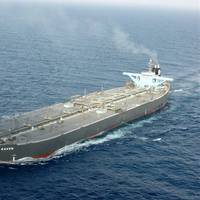
The global shipping industry is unlikely to meet an end-2016 deadline for setting targets and developing a plan to reduce its greenhouse gas emissions, Europe's shipping industry lobby said on Friday. The European Commission this week called on the International Maritime Organization (IMO) to present measures to cut emissions by the end of 2016. The move is part of an EU pledge to cut 1990-level greenhouse gas emissions by 40 percent by 2030. "2016 is right around the corner and as such it is rather unrealistic to expect the IMO to come up with a solution in a matter of months…
Fishermen Accuse Chevron of Oil Spill, Demand Compensation
About 500 fishermen in Angola's Cabinda province are demanding compensation from Chevron Corp, saying it was behind an oil spill that prevented them from catching fish for nearly two weeks, an industry body said on Tuesday. Environmental authorities in the southern African country found traces of oil more than two weeks ago on the shores of the beach in the northern Cabinda province but has not given the size of the spillage or who it believes is responsible. Industry lobby group Caconga Voice of Fishermen Association accused Chevron of causing the leak and said each of the nearly 500 fishermen was demanding $2,000 from the U.S. company for each of 11 to 12 days they were unable able to catch fish.
UK North Sea Investments to Halve
Investment in British North Sea projects is expected to fall below 8 billion pounds ($12.35 billion) in 2016 from 14.8 billion last year, and could shrink further due to a rise in costs and fall in prices, industry lobby group Oil & Gas UK said in an annual survey on Tuesday. Falling investment means much of Britain's remaining oil reserves will not be extracted, said Malcolm Webb, chief executive of Oil & Gas UK, casting doubt on a North Sea revival which the government hopes will help fill its coffers. "Without sustained investment in new and existing fields, critical infrastructure will disappear, taking with it important North Sea hubs, effectively sterilising areas of the basin and leaving oil and gas in the ground," Webb said.
Maine Port City Bans Oil Loading

City councilors in South Portland, Maine, voted late Monday night to ban the loading of crude oil onto tankers along its waterfront, throwing up yet another roadblock to the export of Canadian oil sands crude and setting up a showdown with industry which called the process illegal. The city of 25,000, known for its scenic lighthouses and sweeping views of the island-speckled waters of Casco Bay, is also the east coast's second largest oil port, located at the southern terminus of the Portland-Montreal Pipeline, which currently flows north to Canada.
NZ Ports to Turn Away Cruise Liner
Radio New Zealand says that ports of Auckland is set to turn away one of the world's largest cruise ships after agreeing with its council-owner not to build one of two planned wharf extensions. It said, without the extension, it could not berth the Ovation of the Seas, which means the mega-liner may also drop stops at four other New Zealand ports. The cruise ship industry believes millions of dollars are at risk if extensions to Auckland's Bledisloe Wharf are delayed. After a months-long stoush, Auckland Council yesterday announced an agreement with Ports of Auckland to proceed with only one of two planned wharf expansions at Bledisloe Wharf - the eastern B2 wharf - and to commit to having it removed if the forthcoming Port Future Study found it to be redundant.
Market Weighs on Asia Dry Bulk-Capesize Rates
Tonnage list grows in Pacific, Atlantic oceans; lack of coal cargoes weigh on freight rates. Freight rates for capesize bulk carriers are set to slide further next week, after falling to their lowest level in five weeks, due to a mounting supply of tonnage and uncertain cargo demand, ship brokers said on Thursday. "There's too many ships in the Pacific. There's a lot of ballasters (empty ships) sailing to Brazil," a Singapore-based ship broker said. Capesize freight rates from Australia to China could fall to around $5-$5.20 a tonne next week on this overcapacity, with rates from Brazil to China at $12.50 to $12.75 a tonne, a Shanghai-based capesize broker said on Thursday.
Britain Oil Review: New Regulator Needed to Lift Output
Britain urgently needs its oil and gas companies to pay for a new regulatory body to encourage industry collaboration and counter plunging North Sea production rates, a government review, the first since the mid-1990s, said on Monday. Britain's oil and gas output has fallen about two thirds since its peak at the turn of the century, but reforms could lead to 200 billion pounds ($330 billion) worth of extra oil and gas being extracted, the government said. The North Sea is thought to contain billions of barrels of hard-to-reach oil but with many platforms and pipelines coming to the end of their working lives, time is fast running out to get at them. The review's task was outlining how to make that easier.


